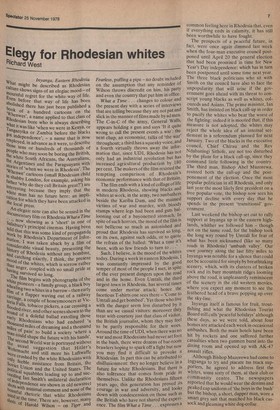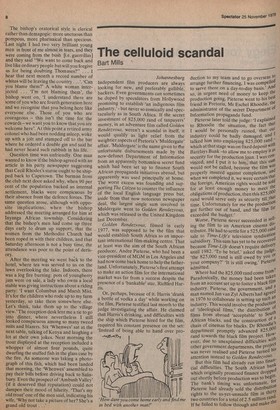Elegy for Rhodesian whites
Richard West
Inyanga, Eastern Rhodesia What might be described as Rhodesian culture shows signs of an elegiac mood.— of mournful regret for the white.way of life. Even before that way of life has been abolished there has just been published a book of a hundred cartoons on the `Whenwes', a name applied to that class of Rhodesian bore who is always describing What it was like 'when we were in Kenya, Or Tanganyika or Zambia before the blacks got independence', — a name that is now employed, in advance as it were, to describe these tens or hundreds of thousands of Pe, oPle who may soon be boring the British, tile White South Africans, the Australians, the Argentines and the Paraguayans with stoves of 'when we were in Rhodesia'. The :Wnenwe cartoons (small Rhodesian child In. shabby London, for example, asking his father 'why do they call Britain great?') are interesting because they imply that the White man has no future here: an imPlication for which they have been attacked in tile local press. An elegaic note can also be sensed in the "°ettmentary filth on Rhodesia What a Time .S;;? now showing as a 'short' in one of -.1sbury,s principal cinemas. Having Work that this Was some kind of propaganda anda „by Rhodesia's Department of InforIllation, I was taken . aback by a film of Considerable visual beauty, presenting the and of Rhodesia without any bombast, _and catching eiactly, I think, the present rod of the whites, which is sorrow rather 1, an anger, coupled with no small pride at 'Laying survived so long. wjhe film begins with photographs of the itiwneeling „ute Pioneers — a family group, a black boy two whites in a barrow — then early cani °f a flapper waving out of a railway triage, a couple of honeymooners at Vies, tobacco pickers, a car crossing a c'eded river, and other scenes shown to the :011nd of a doleful ballad extolling those trY Rhodesians who had endured 'a t1sand miles of dreaming and a thousand ,uan coes of pain' to build a society -1 'where a uld shape the future with his hands'. tVe second World war is portrayed without we, usual suggestion that Hitler's , etninacht and still more his Luftwaffe Ow .ere crushed by the white Rhodesians with sonly. feeble assistance from Britain, the poiviiteit Union and the United States. The e cal squabbles leading up to and suco-efe.ding Ian Smith's unilateral declaration independence are shown in old newsreel 1431:3°.ts with minimal comment and none of the ii2s.tful rhetoric that white Rhodesians so at the time. There are, however, many 7 °Ls of Harold Wilson — on Tiger and Fearless, puffing a pipe —no doubt included on the assumption that any reminder of Wilson throws discredit on him, his party and even the country that put him in office. What a Time . . . changes to colour and the present day with a series of interviews that are telling because they are not pat and slick in the manner of films made by ad men. The C-in-C of the army, General Walls, appears holding a gun and says 'It it quite wrong to call the present events a war': the next chap, an economist, talks of 'the war' throughout; a third has a squeaky voice, and a fourth virtually throws away the information that, since UDI, Rhodesia has not only had an industrial revolution but has increased agricultural production by 180 per cent. The makers of the film resisted the tempting comparison of Rhodesia's economic performance with that of Britain. The film ends with a kind of collage of life in modern Rhodesia, showing blacks and whites at work, in the army, two sunbathers beside the Kariba Dam, and the maimed victims of war and murder, with bloody stumps where legs had been and guts ballooning out of a bayonetted stomach. In spite of such horrors, the mood of the film is not bellicose so much as astonished and proud that Rhodesia has survived so long, on its own, against such odds, or to quote the refrain of the balled: 'What a time it's been, with so few friends to turn to. • • Such, I believe, is the mood of the whites today. During a week in eastern Rhodesia, I was constantly impressed by the good temper of most of the people I met, in spite of the ever present dangers upon the road and in the home. Even Umtali, the third largest town in Rhodesia, has several times come under mortar attack: hence the facetious T-shirts one sees there — 'Come to Umtali and get bombed'. Yet those who live with the danger seem less disturbed by it than are we casual visitors: moreover they treat with courtesy just that class of visitor, the British journalist, whom they may feel to be partly responsible for their woes. Around the time of UDI, when there was no war and most Rhodesians had never set foot in the bush, there were dozens of bar-room brawlers hoping to spark off a fight but now you may find it difficult to provoke a Rhodesian. In part this can be attributed to disillusionment: they no longer believe in a future for white Rhodesians. But there is also tolbrance that comes from pride in themselves. Unlike the Rhodesians fifteen years ago, this generation has proved its courage in war and adversity, and looks down with condescension on those such as the British who have not shared the experience. The film What a Time. . . expresses a common feeling here in Rhodesia that, even if everything ends in calamity, it has still been worthwhile to have fought.
The prospects of a peaceful future, in fact, were once again dimmed last week when the four-man executive council postponed until April 20 the general election that had been promised in time for New Year's Day independence: which has in turn been postponed until some time next year. The three black politicians who sit with Smith on the council have also to face the unpopularity that will arise if the government goes ahead with' its threat to con script young blacks as well as whites, col oureds and Asians. The prime minister, Ian Smith, has insisted on black call-up in order to pacify the whites who bear the worst of the fighting: indeed it is mooted that, if this measure is not adopted, the whites may reject the whole idea of an internal settlement in a referendum planned for next January. Two of the blacks in the executive council, Chief Chirau and the Rev Ndabaningi Sithole, are not too disturbed by the plans for a black call-up, since they command little following in the country. The third man, Bishop Abel Muzorewa, resisted both the call-up and the post ponement of the election. Once the most popular politician in all Rhodesia, and only last year the most likely first president on a free popular vote, the bishop now sees his support decline with every day that he spends in the present 'transitional' government.
Last weekend the bishop set out to rally support at Inyanga up in the eastern high lands, whither we followed him — though not on the same road, for the bishop took the long way round by Umtali for fear of what has been nicknamed (like so many roads in Rhodesia) 'ambush valley'. Our own journey along the last fifty miles to Inyanga was notable for a silence that could not be accounted for simply by breathtaking scenery, which, with its clusters of broken rock and its bare mountain ridges looming above the road, is unpleasantly reminiscent of the scenery in the old western movies, where you expect any moment to see the feathered head of a brave popping up over the sky-line.
Inyanga itself is famous for fruit, troutfishing and what the Rhodesian Tourist Board still calls 'peaceful holidays' although these days, so we were told, about four homes are attacked each week in occasional ambushes. Both the main hotels have been hit by rockets and one suffered further casualties when two gunmen burst into the dining room and opened up with AK-47 assault rifles.
Although Bishop Muzorewa had come to Ingyanga to try and placate his black sup porters, he agreed to address first the whites, some sixty of them, at their club or community centre. The newspapers reported that he would wear the denims and peaked cap uniform of 'the boys in the bush' but the bishop, a short, dapper man, wore a smart grey suit that matched his black cassock and gleaming white dog-collar. The bishop's oratorical style is clerical rather than demagogic: more unctuous than pompous, more pharisaical than specious. 'Last night I had two very brilliant young men in front of me almost in tears, and they were coming from the bush [i.e. guerrillas] and they said "We want to come back and live like ordinary people but will you forgive us for being doubting Thomases?" . . . I hear that next month a record number of whites will be leaving the country. . 'Can you blame them?' A white woman interjected . . . 'I'm not blaming them', the bishop went on, 'I understand there are some of you who are fourth generation here and we recognise that you belong here like everyone else. Those of you who are courageous — this isn't the time for the cowards —we want you to know that you are welcome here'. At this point a retired army colonel who had been nodding asleep, woke up with a jolt and stumped off to the bar where he ordered a double gin and said he had never heard such rubbish in his life.
Question time was unfriendly. One man wanted to know if the bishop agreed with an article in his party newspaper suggesting that Cecil Rhodes's statue ought to be shipped back to Capetown. The barman from the club next door asked why, when 90 per cent of the population backed an internal settlement, blacks were conspicuous by their absence from the defence forces. The same question arose, although with opposite implications, when the bishop addressed the meeting arranged for him at Inyanga African township. Considering that the bishop's men had come up three days early to drum up support, that the women from the Methodist Church had been roped in with their children, and that Saturday afternoon is not a busy time, the attendance was poor to the point of derisory.
After the meeting we went back to the hotel, where tea was served to us on the lawn overlooking the lake. Indoors, there was a log fire burning: pots of youngberry jam were on sale, a lady who owns a local stable was giving instructions about a riding party: 'I want Columbus and Marsh Mist. It's for the children who rode up to my farm yesterday, so take them somewhere else. Let's think, take them up to the village view.' The reception desk lent me a tie to go into dinner, where nevertheless I still looked conspicuous among so many tweed suits and blazers. Six Whenwes' sat at the next table, talking of Kenya and laughing a lot at their own jokes. Next morning the trout displayed at the reception included a whopper of almost four pounds, quite dwarfing the stuffed fish in the glass case by the fire. As someone was taking a photo graph of this fish, which had been landed that morning, the `Whenwes' assembled to pay their bills before driving back to Salis bury. Even the prospect of 'Ambush Valley' (if it deserved that reputation) could not dampen their mood of hilarity. 'That's my old trout' one of the men said, indicating his wife, 'Why not take a picture of her? She's a grand old trout. .



































 Previous page
Previous page